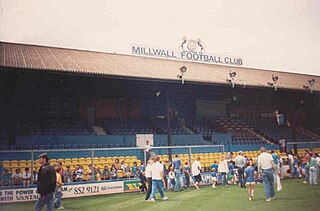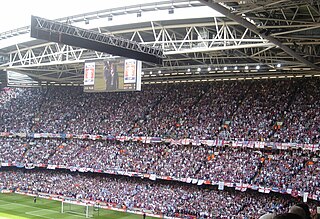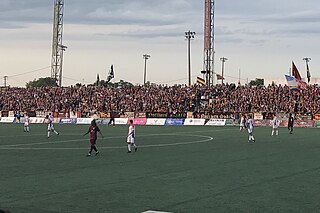
A football chant or terrace chant is form of vocalisation performed by supporters of association football, typically during football matches. Football chanting is an expression of collective identity, most often used by fans to express their pride in the team or encourage the home team, and they may be sung to celebrate a particular player or manager. Fans may also use football chants to slight the opposition, and many fans sing songs about their club rivals, even when they are not playing them. Sometimes the chants are spontaneous reactions to events on the pitch.

Millwall Football Club is a professional football club in Bermondsey, South East London, England. They compete in the EFL Championship, the second level of English football. Founded as Millwall Rovers in 1885, the club has retained its name despite having last played in the Millwall area of the Isle of Dogs in 1910. From then until 1993, the club played at what is now called The Old Den in New Cross, before moving to its current home stadium nearby, called The Den. The traditional club crest is a rampant lion, referred to in the team's nickname The Lions. Millwall's traditional kit consists of dark blue shirts, white shorts, and blue socks.

Ultras are a type of association football fans who are renowned for their fanatical support. The term originated in Italy, but is used worldwide to describe predominantly organised fans of association football teams. The behavioural tendency of ultras groups includes singing football chants, playing musical instruments such as drums, their use of flares and smoke bombs, vocal support in large groups and the displaying of flags and banners at football stadiums, all of which are designed to create an atmosphere which encourages their own team and intimidates the opposing players and their supporters. The frequent use of elaborate displays in stadiums is also common.

Violence can also come as a result of a player's poor performance.
The Chelsea Headhunters are a notorious English football hooligan firm linked to the London football club Chelsea.

The Old Den was the fifth football stadium occupied by Millwall F.C. in Cold Blow Lane, New Cross, London since their formation in Millwall on the Isle of Dogs in 1885 before moving to the New Den, in May 1993. The ground opened in 1910 and was the home of Millwall for 83 years. It boasted a record attendance of 48,672. Millwall played a total of 1788 games at the Den in all competitions, winning 976, losing 360 and with 452 drawn.
The Zulu Warriors are a football hooligan firm associated with English football club, Birmingham City. The Zulu Warriors were formed in the late 1980s and the name allegedly came from a chant of "Zulu, Zulu" which Manchester City fans aimed at Birmingham in 1982, due to their multicultural following. However, both the "Zulu" chant and the term "Zulu Warriors", in the context of a fan following rather than as an organised gang, were in use from at least the mid 1970s.

The Muckers are a football hooligan firm linked to the football club Blackpool F.C. They take their name from the word mucker, a colloquialism meaning good friend.
The Millwall Bushwackers are a football firm associated with Millwall Football Club. Millwall have a historic association with football hooliganism, which came to prevalence in the 1970s and 1980s, with a firm known originally as F-Troop, eventually becoming more widely known as the Millwall Bushwackers, who were one of the most notorious hooligan gangs in England. On five occasions The Den was closed by the Football Association and the club has received numerous fines for crowd disorder. Millwall's hooligans are regarded by their rivals as amongst the stiffest competition, with Manchester United hooligan Colin Blaney describing them as being amongst the top four firms in his autobiography 'Undesirables', and West Ham hooligan Cass Pennant featuring them on his Top Boys TV YouTube channel, on which their fearsome reputation for violence was described.
The MIGs are a football hooligan "firm" associated with the English football club Luton Town, which was originally formed in the 1980s.
"Carefree" is a football chant, sung by followers of Chelsea football club, mainly at away games, and meant to demonstrate indifference and possibly belligerence when in an alien, hostile environment. The original tune is "Lord of the Dance”.

The rivalry between Millwall and West Ham United is one of the longest-standing and most bitter in English football. The two teams, then known as Millwall Athletic and Thames Ironworks, both originated in the East End of London, and were located less than three miles apart. They first played each other in the 1899–1900 FA Cup. The match was historically known as the Dockers derby, as both sets of supporters were predominantly dockers at shipyards on the River Thames. Consequently, each set of fans worked for rival firms who were competing for the same business; this intensified the tension between the teams. In 1904, West Ham moved to the Boleyn Ground which was then part of Essex until a London boundary change in 1965. In 1910, Millwall moved across the River Thames to New Cross in South East London and the teams were no longer East London neighbours. Both sides have relocated since, but remain just under four miles apart. Millwall moved to The Den in Bermondsey in 1993 and West Ham to the London Stadium in Stratford in 2016.

The 1985 Luton riot occurred before, during and after a 1984–85 FA Cup sixth-round football match between Luton Town and Millwall on 13 March 1985 at Luton Town's Kenilworth Road ground in Luton, Bedfordshire, England. It was one of the worst incidents of football hooliganism during the 1980s, and led to a ban on away supporters by Luton Town which lasted for four seasons. This itself led to Luton's expulsion from the Football League Cup during the 1986–87 season. The club also began to enforce a membership card scheme, which Margaret Thatcher's government attempted to have adopted at grounds across England. Kenilworth Road was damaged, along with the surrounding area, and a year later was converted to an all-seater stadium.
There are two Arsenal hooligan firms, The Gooners and The Herd.

Jason Daniel Kelce is an American football center for the Philadelphia Eagles of the National Football League (NFL). He was selected by the Eagles in the sixth round of the 2011 NFL Draft. He played college football for the Cincinnati Bearcats. Kelce is a Super Bowl champion, seven-time Pro Bowl selection, and six-time first-team All-Pro selection. Kelce is often regarded as one of the greatest centers in NFL history.

West Ham United F.C. supporters are the followers of the London-based West Ham United Football Club, who were founded as Thames Ironworks in 1895. There are 700,000 fans on the club's database and over 2,300,000 likes on Facebook. The club's website is in the top ten most visited websites for English football clubs by people in the USA. Their fans are also associated with a once-notorious hooligan element and have long-standing rivalries with several other clubs, most notably Millwall.
The County Road Cutters are a hooligan firm associated with Premier League football club Everton F.C.

Beginning in at least the 1960s, the United Kingdom gained a reputation worldwide for football hooliganism; the phenomenon was often dubbed the British or English Disease. However, since the 1980s and well into the 1990s the UK government has led a widescale crackdown on football related violence. While football hooliganism has been a growing concern in some continental European countries in recent years, British football fans now tend to have a better reputation abroad. Although reports of British football hooliganism still surface, the instances now tend to occur at pre-arranged locations rather than at the matches themselves.

The Northern Guard Supporters are an independent supporters group for Detroit City FC (DCFC) of USL W League and of the USL Championship. DCFC’s men’s side formerly played in the National Premier Soccer League's (NPSL) Midwestern Conference before joining NISA in 2019, and women's side formerly playing in the United Women's Soccer’s (UWS) Midwest Conference

The rivalry between Leeds United and Millwall is a bitter North–South divide rivalry in English football. Millwall were founded in London in 1885 and Leeds United in Yorkshire in 1919, over 170 miles (270 km) apart. Both sides entered the Football League in 1920–21 season, albeit in different divisions. From 1920 to 2003 the sides met just 12 times; competing in different tiers for the majority of their histories, and neither considering the other a rival on the pitch. From 2004 to 2020, the teams met 28 times when Leeds were relegated from the Premier League. The rivalry began in League One during the 2007–08 season, with disorder and violent clashes between both sets of fans and the police at Elland Road. It continued into the 2008–09 season; where the teams were vying for promotion to the Championship, culminating in Millwall knocking Leeds out of the League One playoffs at the semi-final stage.












